
OVERVIEW
MANAGEMENT
PERFORMANCE
POSSIBILITIES
CAPITALS
ACTIVITIES
ACTORS
BURGESS
|
RUSSIAN INVASION OF UKRAINE
HUGE DAMAGE IN TROSTIANETS ‘Barbarians’: Russian troops leave grisly mark on town of Trostianets ... On a two-day visit, the Guardian found evidence of summary executions, torture and looting 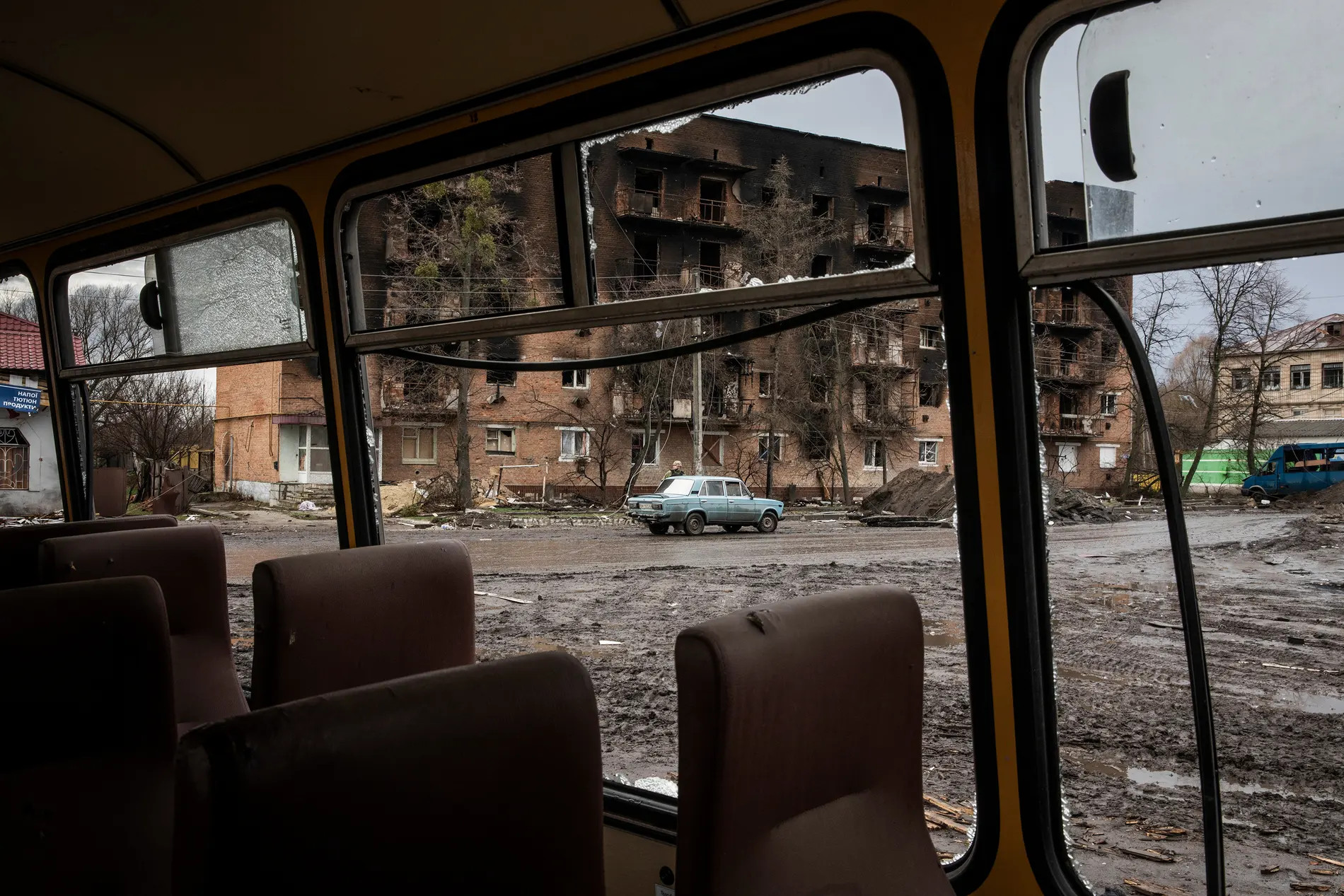
An apartment block in Trostianets occupied by Russian troops and damaged by the Ukrainian army when it retook the town. Photograph: Anastasia Taylor-Lind/The Guardian Original article: https://www.theguardian.com/world/2022/apr/05/barbarians-russian-troops-leave-grisly-mark-on-ukraine-town-of-trostianets Burgess COMMENTARY Peter Burgess | ||
|
‘Barbarians’: Russian troops leave grisly mark on town of Trostianets
On a two-day visit, the Guardian found evidence of summary executions, torture and looting by Shaun Walker in Trostianets. Photographs by Anastasia Taylor-Lind Tue 5 Apr 2022 11.23 EDT The tanks rolled into Trostianets, a sleepy town 20 miles from the Russia-Ukraine border, in the first hours of the invasion. Russian troops fanned out across the town, occupying a number of buildings: the forestry agency headquarters, the railway station and a chocolate factory. Their top general set up his office in room 23 at the local administration building, where the council’s accountants used to sit. His bottle of single malt is still on the desk, the butts of his slim cigarettes perched on the edge of an ashtray. He slept on a single bed stolen from a nearby hotel. His men lived one floor below. They appear to have slept, eaten and defecated in the same rooms, and some of them may have died there too, judging by the bloodied Russian uniforms littering the floor. 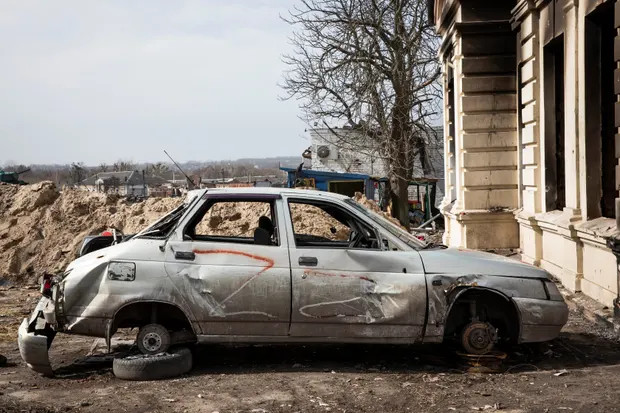
A car with the letter Z, a symbol of support for the Russian invasion of Ukraine, near the train station in Trostianets, occupied by the Russian army and heavily damaged by the Ukrainian army when it recently retook the town. Photograph: Anastasia Taylor-Lind/The Guardian Thirty days after they arrived, amid a fierce Ukrainian counteroffensive, the Russians left Trostianets in a convoy of tanks, other armour, trucks full of loot and numerous stolen vehicles they had daubed with Z signs, the symbol of their invading force. The carnage they left behind will be remembered by the residents of this quaint, historical spa town of 20,000 residents for the rest of their lives, and is yet another indictment of the results of Russia’s unwanted “liberation” mission in Ukraine. 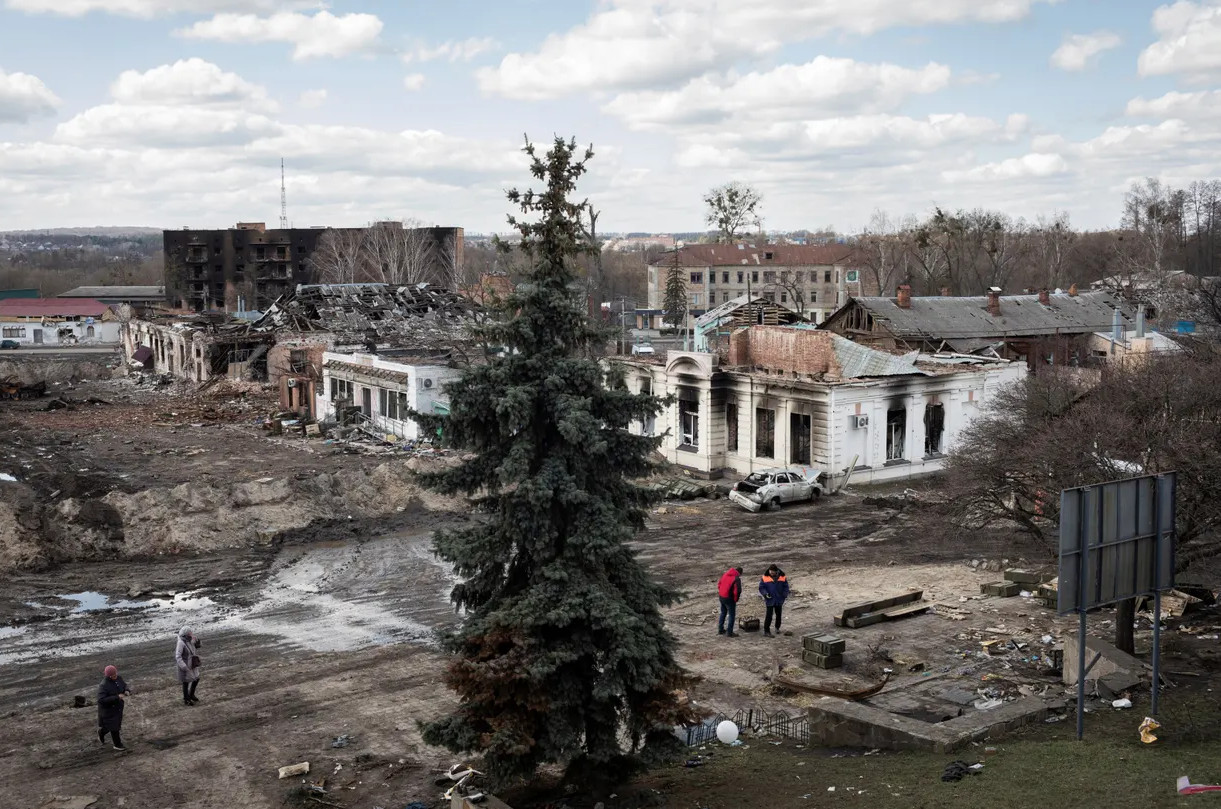
The view from Trostianets train station, which was used as a military position by Russian soldiers. Photograph: Anastasia Taylor-Lind/The Guardian In the square outside the train station, there is now a grim panorama of several mangled tanks, the whitened carcass of a self-propelled howitzer and a shot-up yellow bus with blood smeared on the seats. Hundreds of green ammunition boxes and casings remain, evidence of the shells and Grad missiles the Russians fired from Trostianets into neighbouring towns. Surviving buildings have been daubed with pro-Russian slogans, and crude insults about the Ukrainian president, Volodymyr Zelenskiy. On a two-day visit to the town, the Guardian found evidence of summary executions, torture and systematic looting during the month of occupation, but it will a take a long time to catalogue all the crimes the Russians committed in places like Trostianets. 
A resident of Trostianets pushes her bicycle past destroyed Russian military equipment. Photograph: Anastasia Taylor-Lind/The Guardian For now, the long and difficult clean-up is under way. Ukrainian sappers have removed mines and tripwires from the cemetery, the train station and even the chocolate museum, housed in an elegant villa where the composer Pyotr Tchaikovsky once stayed. Electricity returned for the first time in weeks on Sunday. The first passenger train since the invasion arrived at the wrecked station on Monday. But the streets are still littered with the twisted remains of Russian armoured vehicles, and there is nothing to buy because everything has been looted. Over the weekend, residents wheeled bicycles to the points across town where parcels of food aid were available: cartons of eggs, jars of pickled cucumbers and plastic bags bulging with potatoes, sent by volunteer groups in other parts of Ukraine. In the orderly but irritable queue to receive them, people embraced acquaintances who they were happy to see still alive, and swapped horror stories from the past month. 
Trostianets residents queue to receive food aid. Photograph: Anastasia Taylor-Lind/The Guardian Spotting a journalist, ever more people joined in, shouting over each other. “They smashed my place up.” “They stole everything, even my underwear.” “They killed a guy on my street.” “The fuckers stole my laptop and my aftershave.” A symphony of stories, some of them personal, some of them second-hand, all of them awful. This is a place where a decade ago, people had mostly good things to say about Russia, which is just a short drive away and where many people have friends and family. Now they competed to heap insults on the neighbours that had brought misery upon them. “Barbarians!” “Pigs!” “Bastards!” 
The mayor of Trostianets, Yuriy Bova, in his office in the town administrative building, which was occupied by Russian troops. Photograph: Anastasia Taylor-Lind/The Guardian Yuriy Bova, the mayor of Trostianets, said it was too early to give a reliable estimate of how many civilians the Russians had killed. It was “definitely more than 50, but probably not hundreds”, he said. Bova now struts about town in fatigues, a pistol tucked into the front of his body armour. At the time of the invasion, however, he cut a very different figure. The idea of a Russian invasion had seemed fanciful to him, he admitted. Nonetheless, as the crescendo of US intelligence warnings continued, he called a meeting of those who would like to join a territorial defence force. About 100 people turned up. There are no military installations in Trostianets, and between them, they had a few hunting rifles, a couple of pistols and a few policemen with Kalashnikovs. They agreed to ask Kyiv for weapons. But it was already too late. Three nights later, the invasion began. By breakfast time, a huge column of Russian armour was already on the outskirts of the town. Bova sent a group of foresters to cut down trees along the entrance road, which won them a few hours, and in mid-morning he called another meeting of the territorial defence unit. “Trying to fight against tanks with a few rifles would have meant certain death, so I took the decision that we would become partisans,” said Bova. People had a few minutes to decide whether they would stay or go. The mayor and his deputies left town, retreating to neighbouring villages. 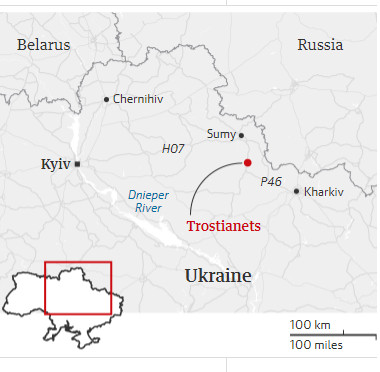
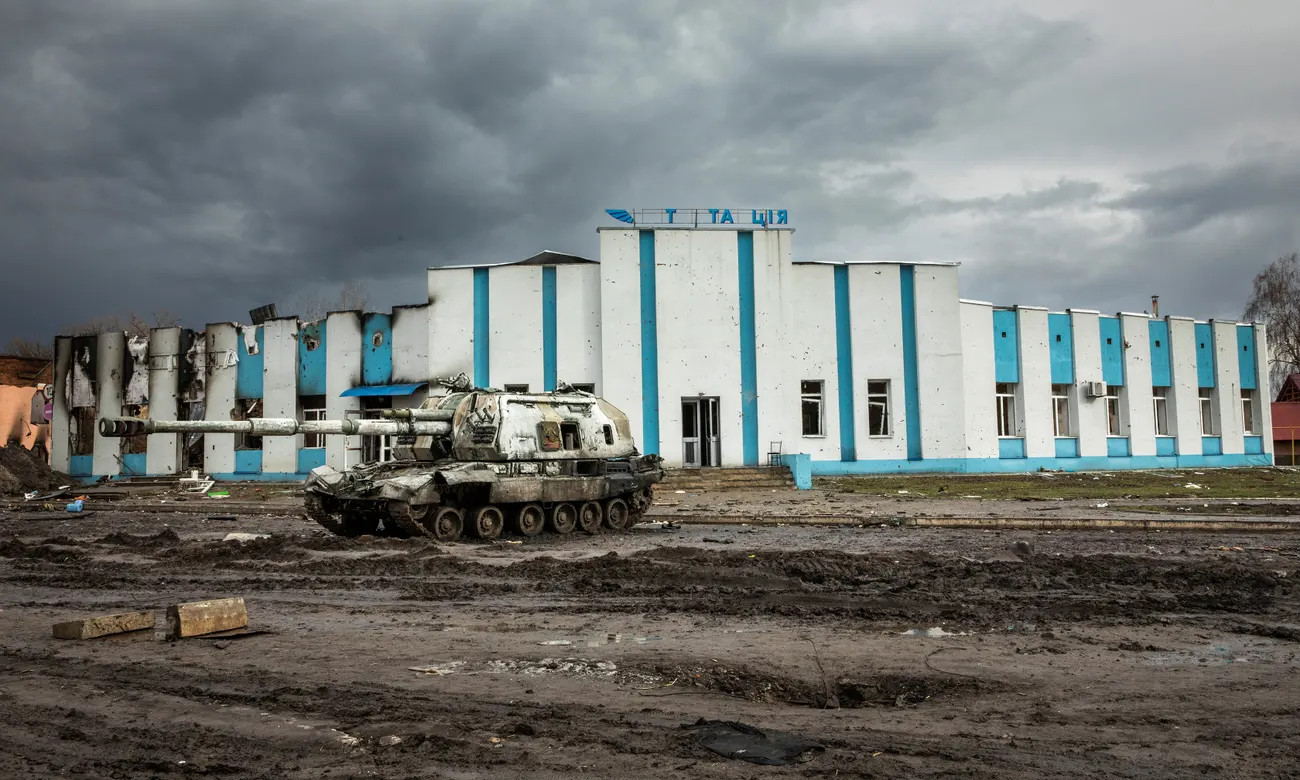
Destroyed Russian military equipment in Trostianets. Photograph: Anastasia Taylor-Lind/The Guardian 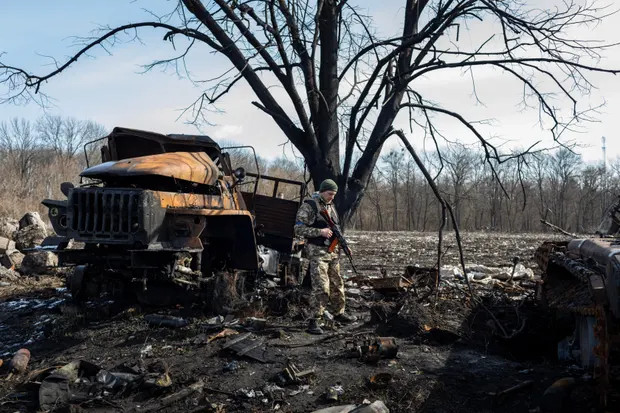
Members of the territorial defence unit survey destroyed Russian equipment in Bilka. Photograph: Anastasia Taylor-Lind/The Guardian When Ukrainian forces blew up a bridge to the south of Trostianets, it stalled Russia’s advance plans, and the town became a hub of Russian servicemen and armour. Local residents retreated to their basements and waited to see what would happen. Some of the first interactions with the occupiers were relatively painless, residents reported. “We were scared of them, but after a while we started pitying them. They had dirty faces, they stank and they looked completely lost,” said Yana Lugovets, who spent a month sleeping in the basement with her husband, daughter and friends. She said a soldier who had come to search the house where they were staying left without completing the task, his eyes filled with shame as her daughter cried out in fear at the intruder. Daria Sasina, 26, who ran a beauty salon near the train station, said when she went to check on it and found seven Russian soldiers had broken in and were sleeping there, they were initially apologetic. 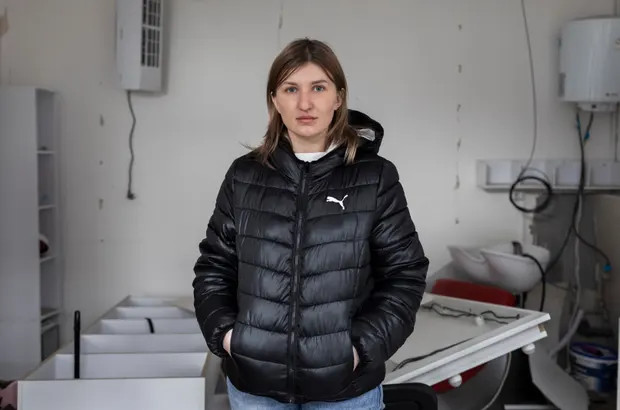
Daria Sasina in her beauty salon in Trostianets, which was looted by Russian soldiers. Photograph: Anastasia Taylor-Lind/The Guardian “I started crying, I was in hysterics. There was a young soldier, and he calmed me down. He said: ‘Listen, I’m sorry. We didn’t know it would be like this.’” Many people recalled similar polite exchanges, or flickers of shame in the eyes of the intruders, but any interaction with the occupiers involved enduring a game of Russian roulette. A few days later, when Sasina, her husband and father went on a risky mission across town to deliver bread to a 96-year-old great aunt, a group of Russian soldiers sprang onto the street behind them and pointed their weapons at them. “There were 20 of them, and they started shouting: “Run, bitches!” We ran through the mud as fast as we could, our legs were freezing and soaked and we were terrified. They started shooting in the air. We could hear them laughing, they thought it was hilarious.” When Sasina went back to check on her small salon the day after the Russians had left, she found they had stolen thousands of dollars worth of expensive hair dyes, shampoos and nail polishes, the hairdryers, all the cutting equipment, a sofa, all the chairs, several lightbulbs and the art on the walls. An air conditioning unit was left dangling down from the wall, its cables having proved stronger than the desire to steal it. 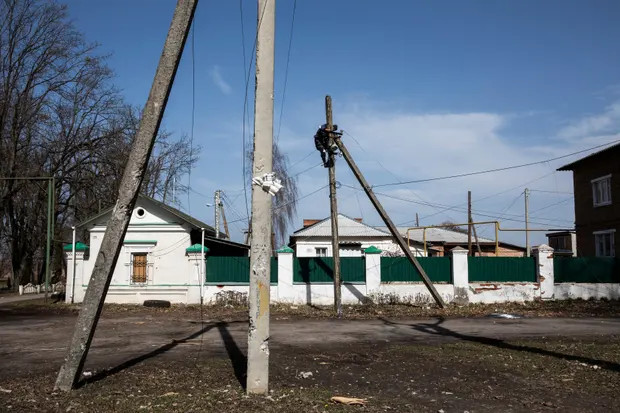
Electricians work to restore power to Trostianets. Photograph: Anastasia Taylor-Lind/The Guardian In return, the Russians had left clumps of their own shaved hair on the floor, and piles of faeces in the neighbouring grocery shop. Somewhere in Russia, the wives and girlfriends of soldiers will presumably soon receive gifts of high-end beauty products. For Sasina, she does not know how she will afford to rebuild her salon. “Everything I worked to build has been destroyed,” she said. The mayor has been criticised by some for his decision to flee, but Bova insists it was the only sensible option. Flicking through photographs on his phone from the occupation days, he showed how people had sent him information about Russian deployments, including from one brave local who managed to fly a drone over their positions. “People told us where they’re sleeping, where they’re eating, where their hardware is,” said Bova. 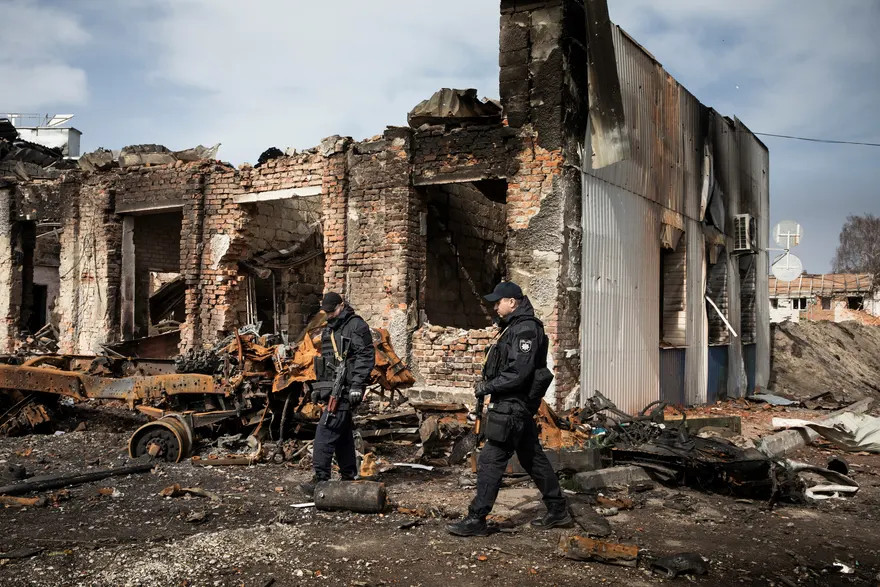
Police officers observe heavily damaged buildings in Trostianets. Photograph: Anastasia Taylor-Lind/The Guardian As the Ukrainian army called in strikes on the Russian positions, the Russians became more and more angry. An expletive-laden audio recording released by the Ukrainian security services purportedly shows a Russian general ordering a missile strike on civilian targets after receiving incoming fire from a nearby village. “Wipe the whole place from the Earth from the eastern side to the west,” he says. As they came under fire more frequently, the Russians cut mobile reception in the town, and went house to house, demanding to examine people’s telephones for compromising information. A handwritten note found amid the mess of the soldiers’ quarters in the train station lists the names of possible enemies to hunt down, with extremely vague identifiers, such as “drives a white off-road vehicle”. 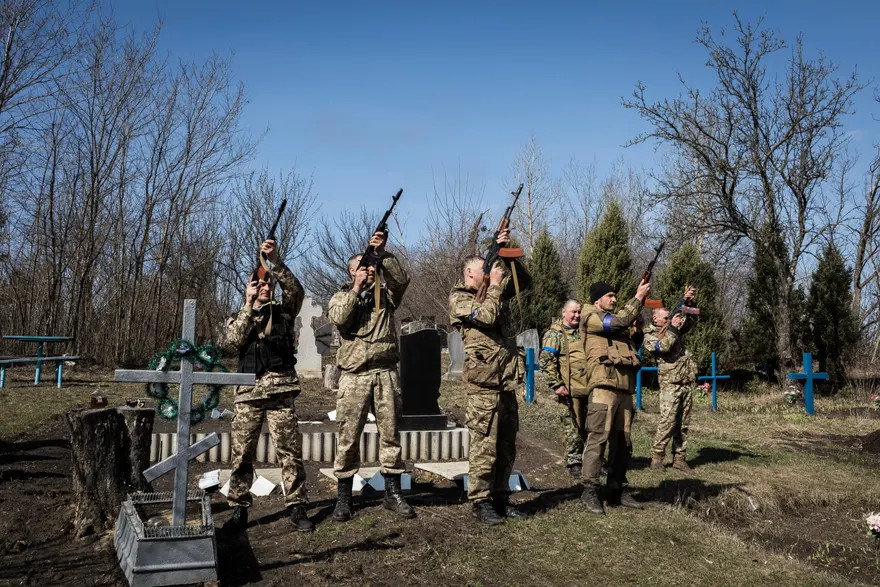
Members of the territorial defence visit the grave of Alexander Kulybaba, a pig farmer killed by Russian soldiers in Bilka village, near Trostianets. Photograph: Anastasia Taylor-Lind/The Guardian In Bilka, a quiet, windswept hamlet just outside Trostianets, where the Russians based more than 200 vehicles, at least two people were executed. Alexander Kulybaba, a pig farmer who protested against the takeover of his barn, was shot on the spot on 2 March, the day the Russians arrived in the village. Mykola Savchenko, a kindly electrician with a handlebar moustache, who together with his wife, Ludmyla, had six foster children, went out on the first morning to find somewhere to charge his and his wife’s mobile phones because the electricity was already down. “I’m just popping out for five minutes,” he told her. He never came back. 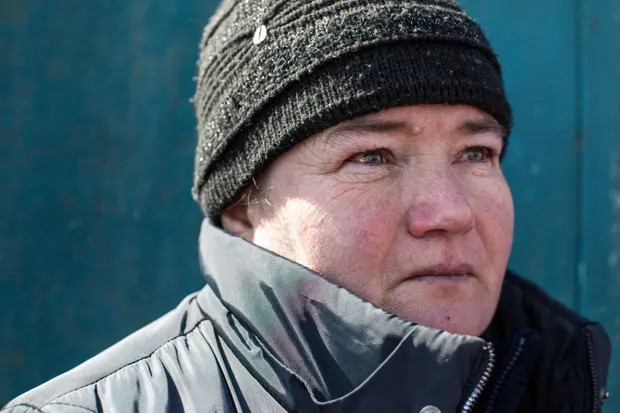
Ludmyla stood outside her home weeping on Monday, holding a stamped death report from the police that explained in neat handwriting that her husband had been “brutally tortured and then killed with a shot to the heart and one to the head”. An inspection found broken bones in his fingers and arms. “I didn’t say anything to the children, because they are small and they still don’t understand everything. Every day they waited for their dad to come home, but he never did. Yesterday, I said to them: ‘Sit down, I will explain everything,’” she said. The youngest of her six children is four, the eldest 11. They stood alongside her, lined up like nesting dolls, silent and confused. Ludmyla insisted her husband had not been active in the resistance to the Russians, but many locals were. On a nearby street, a farmer explained how he hid his smartphone in the dirt inside the pig enclosure, and carried round an old brick phone as a decoy to show to Russian soldiers if asked. Then, in the darkness of night, he would dig up his real phone, scurry to the one spot where he knew there was still reception, and send the new locations of Russian hardware to a relative in the Ukrainian army. “Then they sent in the Bayraktars and fucked them up,” he said with a cackle, referring to the Turkish-made drones that Ukraine has used with deadly effect against Russian columns. “The Russians are dogs, they are subhumans, they are locusts,” he said. 
Members of the territorial defence unit survey Russian positions at Alexander Kulybaba’s pig farm. Photograph: Anastasia Taylor-Lind/The Guardian The boiling fury felt towards the Russians in villages such as Bilka, where people speak a mishmash of Ukrainian and Russian and previously felt far removed from geopolitical concerns, will be a lasting consequence of Vladimir Putin’s grim decision to invade. Along with the anger, there is confusion and disappointment about the attitudes of ordinary Russians. Nadezhda Bakran, 73, a nurse in the local hospital, cowered in the hospital’s basement together with her patients, as a Russian tank took potshots at the building, which is now empty and wrecked. Her nearby apartment block has also been reduced to a skeleton, with all the windows blown out and serious structural damage. 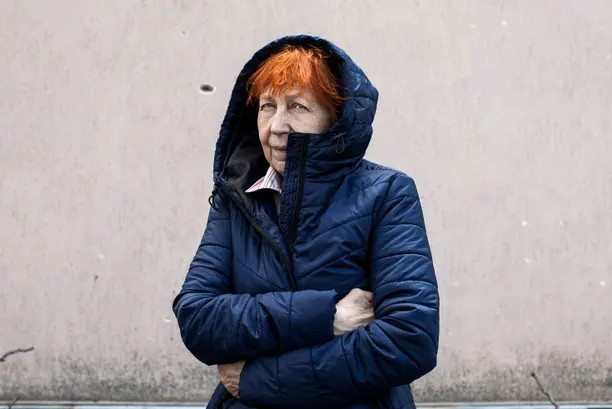
Nadezhda Bakran, a nurse at the hospital in Trostianets. Photograph: Anastasia Taylor-Lind/The Guardian But when she called her best friend in Moscow, with whom she has been on holiday almost every year since they met in Crimea 43 years ago, she heard only sceptical derision and accusations. “I tried to explain it to her, but she doesn’t believe me. She believes her television. I said: ‘Your people are destroying my town’. She said: ‘You caused this war yourself’… We were friends, what we had was even closer than just friendship, and she doesn’t believe me. I don’t understand.” For many, this sense of betrayal from their friends and family has hit almost as hard as the material losses. Sasina, the beauty-salon owner, listed the losses her family had taken from a month of Russian occupation: her house was destroyed, her beauty salon looted, her mother’s toy shop also looted, her friend’s car stolen, daubed with Zs and then smashed up. Her brother now walks on crutches after his car was shot at on the first day at a checkpoint and a bullet lodged in his lower back. Russian soldiers even shot her grandmother’s cat during a house inspection, she said. When Sasina called her aunt, who lives outside Moscow and had visited her in Trostianets most summers, to inform her of the horrors unfolding, her aunt told her she was talking nonsense. “She said it’s not possible, she said probably the soldiers are Ukrainians dressed up as Russians. She has stopped speaking to me now,” Sasina said, shaking her head in disbelief. 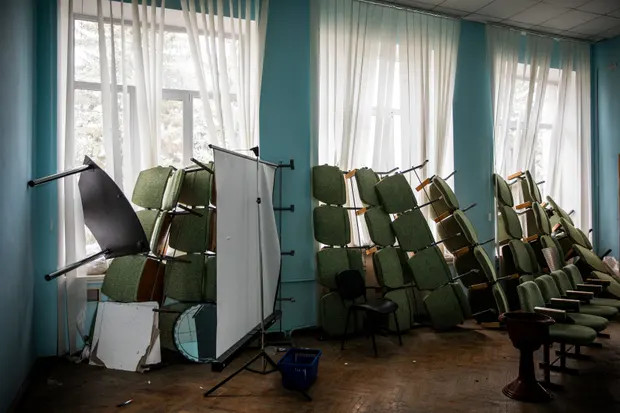
The town administrative building in Trostianets. Photograph: Anastasia Taylor-Lind/The Guardian The Russian soldiers who made it out of Trostianets alive may never speak about the anger they witnessed and the carnage they caused, as they return to a country where their operation in Ukraine has been referred to by state propaganda as a heroic mission to save their neighbour from the clutches of radicals and neo-Nazis. Russian television viewers may never see the ugly truth of the cost of their army’s unwanted intervention, although many Russian families will now be mourning lost sons and brothers. The yellowed bodies of three Russian soldiers lie unclaimed and unrefrigerated in the Trostianets hospital morgue. A Ukrainian soldier involved in retaking the town estimated that up to 300 may have died here. In the basement of the train station, weak torchlight reveals an improvised field hospital where the Russians treated their wounded. Silver padding had been placed over two desks to create makeshift operating tables. The floor was littered with tablets and other medical supplies. A medical drip remained, fastened to a coat stand. 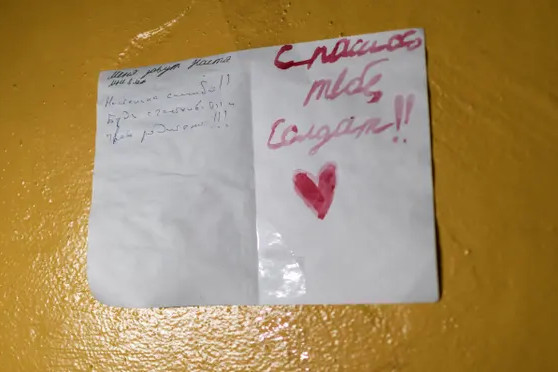
A hand written card taped to the wall in the basement of Trostianets train station, which was used as a military position by Russian soldiers. Photograph: Anastasia Taylor-Lind/The Guardian On the wall in the corridor outside was perhaps the most jarring sight in all Trostianets. Children’s drawings brought from Russia were taped to the wall, gifts from schoolchildren in honour of Army Day, the day before Russia’s invasion. The cards were decorated with pretty, colourful flowers and messages of support written in spidery youthful handwriting. One was signed by Sasha P, first grade, and came with drawings in crayon and a printed message. It read: “Thank you, soldier, for making sure I live under a peaceful sky.”
| The text being discussed is available at | https://www.theguardian.com/world/2022/apr/05/barbarians-russian-troops-leave-grisly-mark-on-ukraine-town-of-trostianets and |